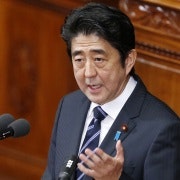Abenomics is not a lost cause yet
Have no fear, there's hope for Japan yet. A string of bad data over the past week -- industrial production is shrinking, consumer spending is sliding, Prime Minister Shinzo Abe's popularity is crumbling -- raise the prospect that Abe's eponymous reform program is grinding to a halt. Look a little closer, however, and it seems that Japan might just be on the verge of getting some of the reform it needs after all, whether Abe realizes it or not.
The failures certainly are embarrassing, although predictable. Abe promised to deliver 2 per cent inflation in an economy with an aging and shrinking population, and to that end installed a central banker who engineered a massive expansion of the money supply and depreciation of the yen. This was popular for a while, especially since rising property prices have benefited homeowners.
But now Japanese have figured out that this comes at the cost of rapidly falling real wages and declining purchasing power for the growing number of retirees on fixed incomes. Friday's news that inflation slowed last month and is unlikely to hit Abe's target is good news for the economy.
Something similar is afoot with the trade balance, which last week marked two years of monthly deficits. This is unsurprising for a developed economy with ever-fewer workers, a high cost base that Abe's promised inflation would have made higher, and a massive innovation shortfall relative to the likes of South Korea.
Abe's weak-yen policy failed to boost the quantity of exports, whatever lift it gave to the yen-denominated value of those shipments. Instead Japanese exporters are steadily building offshore factories where the workers, and growing markets, are.
Fortunately Japan doesn't need higher prices and more exports. It needs a healthier domestic-facing economy capable of stimulating domestic consumption through productivity-boosting investment in sheltered industries while goosing household purchasing power. And on this score, some reforms Abe has started -- perhaps "stumbled into" is the better expression -- will have a more lasting effect.
Count in this category the corporate tax-rate cut he proposes, which would bring Japan's top corporate rate, currently second only to America's, down to around 29 per cent in three years from just above 35 per cent today. Although big companies have been the rate cut's most enthusiastic boosters, this would be a boon for small firms, too.
There are signs that companies, and especially small- and medium-sized enterprises, will use the extra money they aren't handing the tax man to boost capital expenditure and hiring at home, according to Nicholas Smith of CLSA. He cites a Teikoku Databank survey of more than 10,000 companies, 32 per cent of which said they would use the saved tax money for salaries, bonuses or more hiring, and 20 per cent of which said they would invest in machinery. Smaller firms in particular would be more likely to invest in people.
That suggests the tax cut can help unstick one of Japan's biggest sticking points: its failure to develop effective new transmission mechanisms by which corporate earnings, including Japan Inc.'s growing inflow of earnings from its overseas investments, can find their way into the hands of domestic spenders.
This used to be accomplished via Japan's famous system of lifetime employment, which guaranteed workers salaries no matter how productive or otherwise they were. As that system becomes untenable, Japan needs to find something else. A corporate tax cut that increases both employment and the productivity on which wages are based is a start.
Similarly, Abe has rolled out a tranche of corporate-governance reforms that give institutional investors greater sway over management. This marks a new transmission mechanism for spreading corporate earnings through the economy, since the stated goal of the governance measures is to encourage companies to spend their enormous cash hoards in the name of boosting shareholder returns.
And on down the list of Abe's quieter reform measures. A proposed electric-market liberalization introducing greater competition in transmission and generation would redistribute economic windfalls from overcharging monopolist utilities to households that would pay lower electricity rates. Almost unnoticed, Abe has made a start at agricultural land reforms that could eventually lead to greater investment and productivity, and therefore lower consumer prices.
This isn't to say there aren't any shortcomings. His failure to open Japan further to trade, either via the stalled Trans-Pacific Partnership trade-deal negotiations or unilaterally, belongs in the loss column. So does a consumption-tax hike that works against his more laudable proposals by trying to transfer wealth from the domestic economy to the government and depressing purchasing power in the process. Reforms that would change Japan's course, rather than help it better adapt to the course it's already on, are in short supply. The biggest omission in this regard is immigration liberalisation.
Still, at a time when so many developed-country leaders are fighting economic gravity in one way or another, Abe stands out from the pack. Monetary misadventures notwithstanding, he's come up with a few ideas that are genuinely aligned with Japan's long-term interests. Perhaps it's time to cut Abe some slack.
This article was originally published in the Wall Street Journal. Reproduced with permission.
















